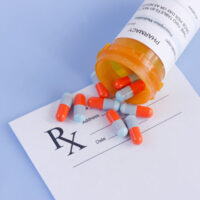Overview Of Prescription Drug Crimes Under Maryland Law

The topic of drug crimes under Maryland law generally evokes the notion of illegal substances, such as cocaine or heroin. But in addition to prohibitions against possession or distribution of illegal drugs, Maryland also has regulations to govern prescription drugs. The sale, possession, and use of prescription drugs are only legal if accomplished in accordance with Maryland law.
Dispensing Prescription Drugs
Maryland Code of Criminal Law Section 5-701 establishes the regulations for dispensing prescription drugs. Under this section, a person may only dispense prescription drugs pursuant to:
- An authorized provider’s electronic prescription;
- An authorized provider’s written prescription;
- An authorized provider’s oral prescription, if a pharmacist reduces to writing and files;
- A refill to an existing prescription authorized by the authorized provider in the original prescription; or
- A refill to an existing prescription authorized orally by the pharmacist and reduced to writing and files.
In addition, Section 5-701 prohibits any person from filling or refilling a prescription without the following information on the label of the drug:
- Name and address of the dispenser;
- Serial number and date of the prescription;
- Name of the authorized provider; and
- Name and address of the patient and directions for use, if specified in the prescription.
Furthermore, Section 5-701 makes it unlawful for person to:
- Manufacture or distribute any prescription drug, unless authorized under Maryland law;
- Possess any prescription drug with intent to manufacture or distribute, unless authorized under Maryland law;
- Place a false or counterfeit label to the container of any prescription drug;
- Remove, alter, or omit the label of any prescription drug, in violation of applicable law; or
- Obtain or attempt to obtain any prescription drug through fraud, deceit, or misrepresentation.
- Any person who violates Section 5-701 will usually face misdemeanor charges. If convicted of these charges, the maximum punishment includes 24 months in jail and $1,000 in fines, either or both.
Selling Drugs Other than Prescribed
Maryland Code of Criminal Law Section 5-702 provides the rules against selling drugs that were not prescribed. Under this section, a person may only dispense the drugs listed in a valid prescription. It is illegal to sell a different prescription drug or controlled substance that what is listed on the prescription.
Any person who violates Section 5-702 will typically face misdemeanor charges. If convicted of these charges, the punishment includes one to 12 months in jail and $100 to $500 in fines, either or both.
On top of the criminal penalties described above, Section 5-702 details another potential consequence. If a person holds a license under Title 12 of the Health Occupations Article, a violation of Section 5-702 will result in license revocation.
Do You Need Legal Help?
For help with your case, reach out to the skilled Bel Air drug crimes lawyers at Schlaich & Thompson, Chartered. We are prepared to assist you today.
